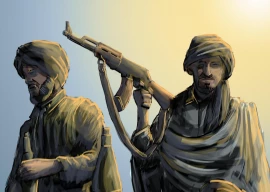
The slow progress stands in contrast to the government’s tall claims regarding women development and empowerment — with such a body in place since March 23, 2012.
The previous commission under the old act concluded its term in the third week of March this year. A revised legislation to make the NCSW an independent body was passed on February 2, 2012. The legislation was subsequently signed by President Asif Ali Zardari on March 8.
Unfortunately, no preparation was undertaken to appoint new members for the commission under the revised act. No arrangements were made to either extend the term of the previous commission or introduce some transitional mechanism as a stopgap measure.
The donor-funded contractual staff was eventually withdrawn and the commission’s functions have been suspended since.
After the first round of applications for the commission’s chairperson in April, shortlisted names were never forwarded to the premier and the leader of the opposition by the human rights ministry. Following a lapse of four months, the vacant position was advertised once again on August 7.
It’s been speculated that significant politicking, especially with female parliamentarians, led to the delay. The official pretext given claimed that the wording of the new act required a public notice be put up for ‘suggestions’ rather than applications for the chairperson. Some criticism on re-advertising the post implied the door was being reopened for a Pakistan Peoples Party (PPP) candidate.
Six names were finally shortlisted and forwarded to the PM and opposition leader on September 6. The list included the names of Dr Fouzia Saeed, Anis Haroon, Khawar Mumtaz and Muniza Hashmi among others.
Since then, no progress has been reported.
Talking to The Express Tribune, prominent women’s rights activist Tahira Abdullah said she had never seen such a long delay in the appointment of the next chairperson.
“This shows how low the government prioritises women’s concerns,” she added.
“A candidate acceptable to all sections and segments should be selected.”
Farzana Bari, another women’s rights activist, said the delay indicated two things: “Empowering women is not a top priority for the government and the candidates shortlisted are not favoured by the committee members.”
Meanwhile, a split in nominations between the Sindh and Punjab Women’s Action Forums (WAF) is raising further concerns. The Sindh WAF endorses a candidate from Karachi, while many in its counterpart in Punjab put forth a name from Lahore.
Published in The Express Tribune, September 20th, 2012.

1732071267-0/lana-(2)1732071267-0-165x106.webp)
1727242355-0/Diddy-(1)1727242355-0-165x106.webp)

1732063440-0/elon-(3)1732063440-0-165x106.webp)


1732080054-1/Copy-of-Untitled-(48)1732080054-1-270x192.webp)









COMMENTS
Comments are moderated and generally will be posted if they are on-topic and not abusive.
For more information, please see our Comments FAQ